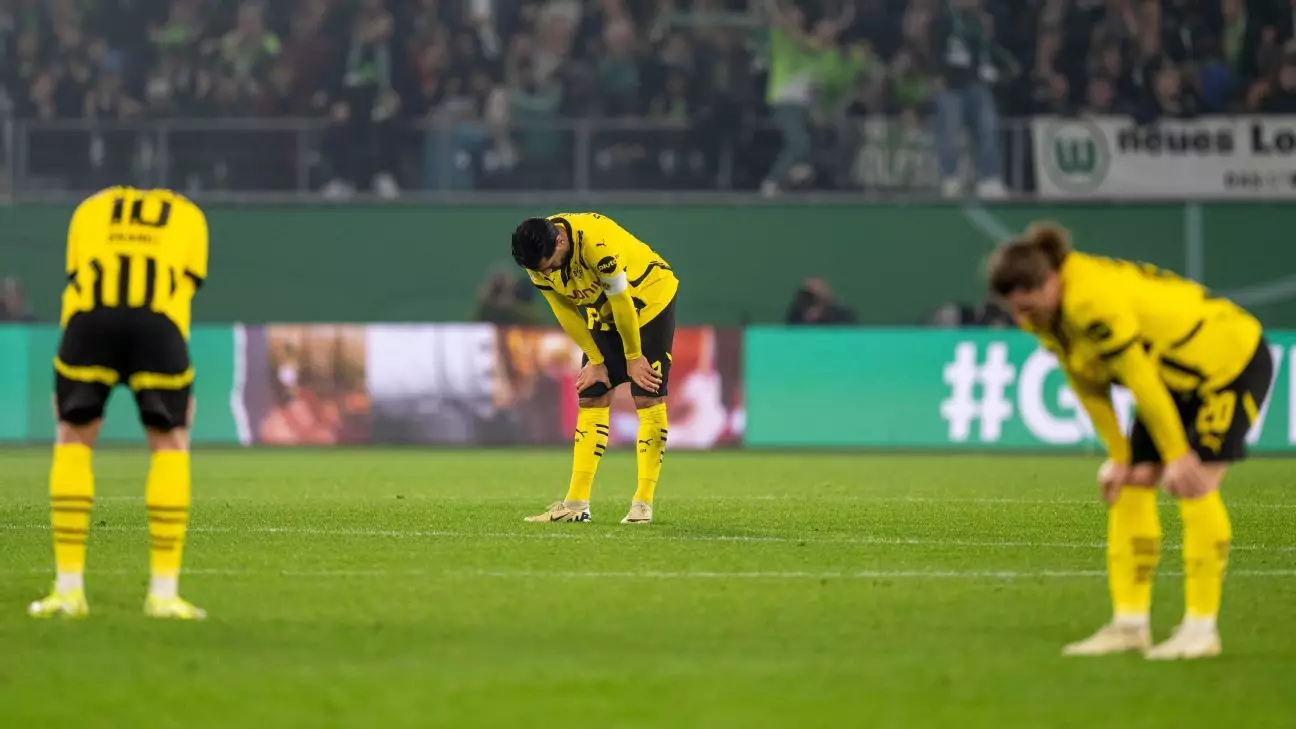Borussia Dortmund is once again at the forefront of German football, but this time for reasons that are far from ideal. Following a string of disappointing defeats to FC Augsburg and VfL Wolfsburg in the Bundesliga and DFB-Pokal respectively, the team finds itself in a precarious position. Under the stewardship of first-year coach Nuri Şahin, criticism has mounted, especially concerning his decision-making during crucial moments of matches. Relying on a mix of tactical errors and questionable personnel choices, Şahin has faced backlash, most notably for his debacle against Real Madrid in the UEFA Champions League. Transforming a secure 2-0 lead into a staggering 5-2 loss left fans and analysts alike raising their eyebrows in disbelief.
The recent clash against Augsburg provided no respite. Dortmund’s performance was lackluster—lacking the necessary dynamism and attacking flair that traditionally characterizes their style of play. Although Donyell Malen opened the scoring, the initial lead quickly evaporated under sustained pressure, culminating in yet another disappointing result. With the team struggling to recover from its recent setbacks, the upcoming matches present dire challenges for the Schwarzgelben.
The predicament is exacerbated by an injury list that has left Şahin scrambling for solutions. Against Wolfsburg, he resorted to unconventional formations, deploying players like Pascal Groß as a right-back and shifting Julian Brandt to a defensive midfield role. The fluidity and cohesion that is essential in high-stakes games have become luxuries rather than norms for Dortmund this season. Their inability to assert dominance away from home, contrasting sharply with their impeccable performance at Signal Iduna Park, paints a troubling picture for fans.
Leadership, particularly on the pitch, has waned significantly. Key figures like goalkeeper Gregor Kobel and club captain Emre Can seem to be struggling with their form and influence. This has engendered a sense of uncertainty within the squad—what the Germans refer to as “Verunsicherung.” As the team slides into unfamiliar territory, the question arises: how much longer can they afford to be on this downward spiral before decisive action is taken at the management level?
Dortmund’s upcoming match against RB Leipzig stands as a crucial test for the beleaguered side. Leipzig has emerged as a formidable opponent under the guidance of coach Marco Rose, who once guided Dortmund before his surprising dismissal. The current Leipzig squad boasts a solid defensive record, with standouts like goalkeeper Peter Gulacsi and defender Willi Orban ensuring that the team remains a bulwark against opposition attacks. Moreover, despite the absence of significant players like Xavi Simons and Xaver Schlager, the team has continued to thrive, with talents such as Lois Openda showcasing their attacking prowess.
The rematch between Dortmund and Leipzig is not just a game; it is a litmus test for Şahin’s tactics and BVB’s collective morale. With Leipzig having triumphed in recent encounters, the pressure mounts for a Dortmund side that desperately needs to re-establish its identity. Failure in this match could lead to an inevitable reevaluation of Şahin’s coaching tenure, given that the club is known for its high expectations and ambitious goals.
Seeking Resilience amid Adversity
In the broader context of German football, Dortmund’s struggles are mirrored by the remarkable performance of other teams. Bayer Leverkusen, for instance, has captivated fans with thrilling matches and newfound energy. The spectacle offered in games like those against VfB Stuttgart has called into question Dortmund’s current trajectory. As other teams consistently light up the field with flair and intensity, the question persists: what must Dortmund change to reclaim their place among Germany’s elite?
One hopeful note arrives from notable matches in the DFB-Pokal, such as the surprise victory of Arminia Bielefeld over Union Berlin. A team currently in the 3. Liga, Bielefeld’s triumph demonstrates that determination and teamwork can yield miraculous outcomes, a lesson that Dortmund must learn quickly. With fate and fortune intertwined on the pitch, fans are left to wonder if their season can undergo a shift akin to the narrative of rebirth witnessed in Bielefeld’s triumph.
As the season unfolds, Borussia Dortmund stands at a crossroads. Questions surrounding management, player fitness, and tactical efficacy loom large. The road to regaining respect in both domestic and continental competitions appears rugged, requiring resilience and strategic changes. The upcoming clashes against capable opponents will determine if the team can navigate this testing phase successfully or face a reality check as they strive for improvement in a season that continues to test their mettle. The clock is ticking, and with it, the patience of supporters and stakeholders alike.

